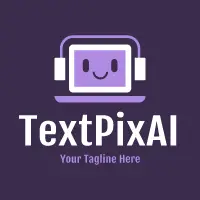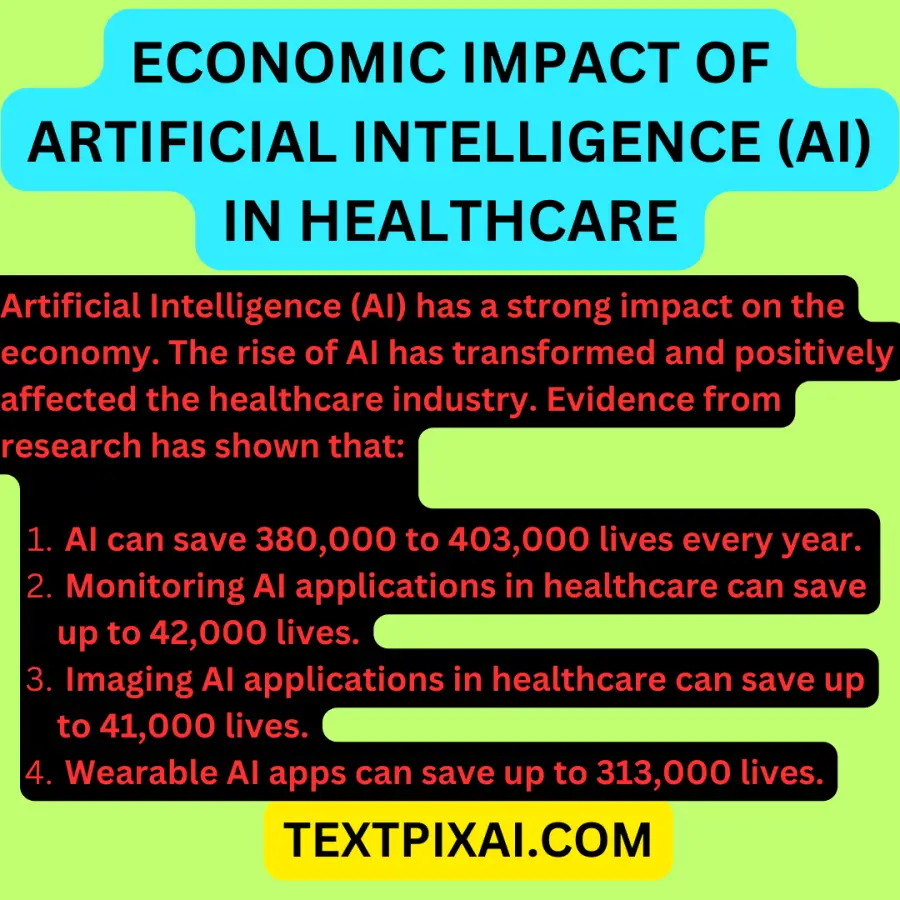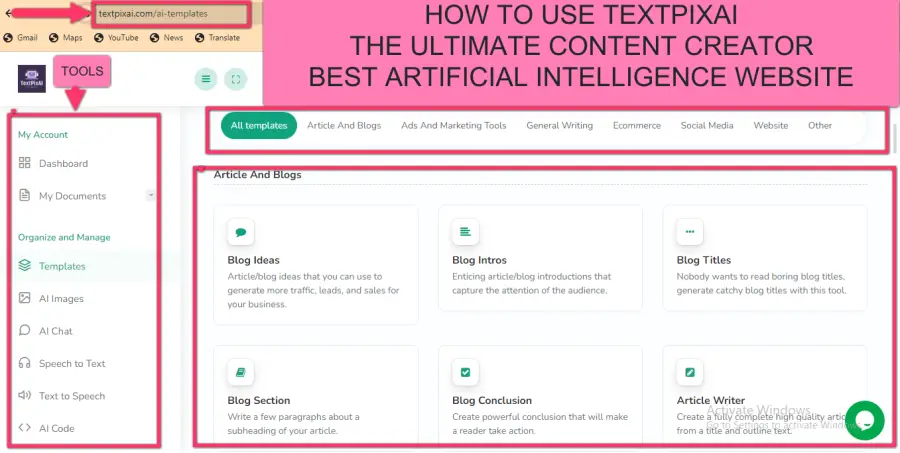The Economic Impact of AI in Healthcare
Introduction
The first use of Artificial Intelligence (AI) was in the early 1970s when MYCIN was used as an AI to identify meningitis and bacteremia and to suggest a befitting antibiotic that would cure the patients. In recent years, the healthcare industry has witnessed a remarkable transformation, one driven by the integration of Artificial Intelligence (AI) into its core functions. This infusion of AI is not only changing the way healthcare is delivered but is also reshaping the economic landscape of the entire industry. AI has a strong impact on the economy. This is because the rise of AI has transformed and positively affected the healthcare industry. Evidence from research has shown that:
- AI can save 380,000 to 403,000 lives every year.
- Monitoring AI applications in healthcare can save up to 42,000 lives.
- Imaging AI applications in healthcare can save up to 41,000 lives.
- Wearable AI apps can save up to 313,000 lives.
- It was also estimated that adopting AI could save the United States about 200 - 360 billion dollars every year in 2019.
The use of AI in healthcare could improve the quality of healthcare, equip healthcare practitioners with fast and quality tools, improve patients satisfaction and above all, save more lives. The more lives saved the more healthy and productive a society will be, and the productivity of any society will result in boosting its economy. Hence, in this comprehensive article, we will look into the multifaceted economic impact of AI in healthcare. I will also explain how AI in healthcare influences cost savings, revenue generation, job creation, investment opportunities, and more. After reading the article, you will understand how AI is changing and developing healthcare economics and creating opportunities for growth and innovation.
You may also like to read:
The Impact of AI in Healthcare
Check our AI tool:
I. Understanding the Economic Impact of AI in Healthcare
A. The Synergy Between Healthcare and Economics
Healthcare has always played an important role in the economy, comprising a large network of providers, insurers, pharmaceutical companies, and other stakeholders. The health indicators of any society, signify the growth of that society. Any society that invests in healthcare, will notice a positive result in its productivity. This is because investing in the healthcare sector can reduce the mortality rate and increase the overall health status of that society. Investing in healthcare is part of human capital development hence its productivity. A productive society is capable of growing its economy to an optimal level. The 2 largest economies in the world like the United States of America (US) and China have invested heavily in healthcare to increase their productivity. The US has invested over 4.4 trillion dollars in 2022, while personal healthcare is over 10 Thousand dollars. We can easily boost these investments by relating the economic impact of AI with healthcare. The integration of AI into healthcare is not just a technological advancement; it is a formidable economic force that could alter traditional models and create new avenues for growth.
B. The Growth of AI in Healthcare
The adoption of AI in healthcare is not just a trend; it's a seismic shift. From diagnosing diseases to managing patient records, AI is becoming an indispensable part of the healthcare ecosystem. This section provides an overview of the rapid growth of AI in healthcare and its potential to reshape economic dynamics. Just recently, a human was able to control his PC with his mind using AI. This is one of the amazing impacts AI can make in the healthcare industry. Additionally, research has shown that doctors, nurses, medical students and other healthcare providers can use AI to know about new developments in their field. Doctors can now use Virtual Assistants to help patients thanks to AI.
II. Cost Savings and Efficiency Gains
A. Streamlining Administrative Processes
One of the most immediate benefits of AI in healthcare is the streamlining of administrative tasks. AI-driven solutions, such as automated billing and claims processing, appointment scheduling, and resource allocation, are making administrative operations more efficient. This not only reduces operational costs but also enhances the overall efficiency of healthcare organizations. With AI we can streamline the administrative process of healthcare through automating routine tasks, optimizing resource allocation, and enhancing decision-making processes. Here is a sample table demonstrating the effectiveness of streamlining administrative processes of healthcare through AI:
| Task | Explanation |
| Automating Routine Tasks | The use of AI systems can help us to handle repetitive administrative tasks. These tasks include scheduling appointments, managing patient records, and processing insurance claims. For instance, AI-driven chatbots can help us in handling appointment scheduling and reminders. Chatbots can free up medical staff to focus on more complex tasks. |
| Optimizing Resource Allocation | We can also use AI to analyze large datasets to predict patient admissions, discharges, and the need for medical resources. This predictive capability of AI in the healthcare environment helps us to optimize staffing levels, reduce patient wait times and ensure that resources are available when needed. For example, AI algorithms can forecast peak times in emergency rooms so that hospitals can allocate staff more efficiently and reduce overtime costs. |
| Enhancing Decision-Making | Similarly, we can use AI systems in the healthcare environment to assist with administrative decision-making by providing data-driven insights. For instance, AI has the power to analyze patient data to identify trends and patterns. These capability helps health administrators make informed decisions about resource allocation and process improvements. Additionally, this capability leads to more efficient operations and better patient outcomes. |
| Improving Claims Processing | AI can streamline insurance claims in the healthcare system by automatically verifying information, identifying discrepancies and flagging potential fraud. This reduces the time and effort required for claims processing and minimizes the likelihood of errors in the healthcare industry. Additionally, AI can speed up approvals and denials thereby improving cash flow for healthcare providers. |
| Reducing Administrative Burden on Clinicians | AI tools can handle administrative tasks traditionally performed by clinicians. These tasks could be updating electronic health records (EHRs) and coding procedures. When we use AI to reduce the administrative burden on clinicians, it gives them more time to spend on patient care. AI improves job satisfaction and reduces burnout in the healthcare industry. |
| Enhancing Patient Engagement | AI-driven systems can improve patient engagement by providing personalized communication and support. For example, we can use AI to send tailored health reminders and educational materials to patients. This procedure encourages them to adhere to treatment plans and attend follow-up appointments. Hence, this proactive approach can lead to better health outcomes and reduced healthcare costs. |
| Streamlining Supply Chain Management | AI can optimize the healthcare supply chain by predicting demand for medical supplies and equipment. AI reduces waste and lowers inventory costs when we ensure that right supplies are available at the right time. Additionally, AI can negotiate better prices with suppliers of healthcare tools by analyzing purchasing data and market trends. |
| Improving Data Management | AI can manage and analyze large amounts of healthcare data to ensure that it is accurate, up-to-date, and easily accessible. This improves the efficiency of administrative processes such as patient record management, regulatory compliance, and reporting. By providing real-time access to critical information, AI enhances decision-making and operational efficiency. |
The implementation of AI in administrative tasks minimizes errors, eliminates redundancies and ensures that healthcare providers can devote more time and resources to patient care.
B. Predictive Analytics for Resource Management
AI-powered predictive analytics is a game-changer in healthcare economics. These systems can forecast patient admission rates, optimize staff schedules, and manage hospital resources efficiently. When we use AI to accurately predict what a patient need, we can judiciously allocate resources to healthcare facilities in order to maximise our effectiveness. This would reduce unnecessary expenditures and improve resource allocation.
C. Reducing Diagnostic Errors
One of the most exciting applications of AI in healthcare is in improving diagnostic accuracy. AI algorithms can analyze large datasets of patient information, medical literature, and diagnostic images with unparalleled speed and precision. This translates into more accurate and timely diagnoses, which, in turn, reduces the need for unnecessary tests and procedures. The economic impact is significant—fewer tests and procedures lead to reduced healthcare costs while simultaneously improving patient outcomes.
III. Revenue Generation and New Business Models
A. Personalized Medicine and Drug Development
AI is not just about cost savings; it's also about revenue generation. AI's ability to recommend personalized treatment plans based on individual patient data is transforming the pharmaceutical industry. By tailoring treatments to each patient's unique genetic makeup and medical history, pharmaceutical companies are not only improving patient outcomes but also unlocking new revenue streams.
AI is also expediting the drug discovery process. By analyzing vast datasets of chemical compounds and their potential interactions, AI algorithms are helping researchers identify promising drug candidates faster and more efficiently. This not only reduces the time and cost involved in bringing new drugs to market but also represents a substantial economic opportunity.
B. Telemedicine and Remote Monitoring
The growth of telemedicine, powered by AI-driven virtual health assistants and remote patient monitoring, is creating opportunities for healthcare providers to expand their reach and generate revenue from telehealth services. Patients can now access healthcare services remotely, reducing the burden on physical healthcare facilities and offering new revenue channels for healthcare organizations.
C. AI as a Service
The emergence of AI as a service (AIaaS) is democratizing access to AI capabilities. Healthcare organizations can now harness the power of AI without significant upfront investments in infrastructure and talent. AIaaS models are revolutionizing how healthcare services are delivered and billed, making advanced AI solutions accessible to a broader range of healthcare providers.
IV. Job Creation and Skill Demand
A. New Career Opportunities
While there are concerns about AI displacing jobs, the integration of AI into healthcare is also creating new career opportunities. Roles such as AI trainers, data scientists, and AI ethicists are emerging as essential components of the healthcare workforce. These careers not only create job opportunities but also demand specialized skills, fostering a culture of continuous learning and skill development.
B. Reskilling and Upskilling
The advent of AI in healthcare necessitates the reskilling and upskilling of the existing healthcare workforce. Healthcare professionals, from doctors and nurses to administrative staff, are required to adapt to AI-driven tools and systems. Reskilling and upskilling programs are essential to prepare the healthcare workforce for the digital era and ensure that they can harness the full potential of AI in their roles.
V. Investment Opportunities
A. Healthcare AI Startups
The healthcare AI sector is a hotbed of innovation, making it an attractive space for startups. Investors are increasingly drawn to innovative AI-driven solutions that address specific healthcare challenges. From diagnostics to patient engagement, startups are revolutionizing the industry with their AI-powered solutions. Investment in healthcare AI startups not only supports innovation but also offers the potential for significant financial returns.
B. Research and Development
AI-driven research and development in healthcare open up opportunities for funding and collaboration. Academic institutions, research organizations, and healthcare companies are actively investing in AI-driven R&D to advance medical science. This collaborative approach can lead to breakthrough discoveries and advancements in medical treatments and technologies.
VI. Challenges and Considerations
A. Regulatory Framework
The integration of AI into healthcare is subject to regulatory oversight. Various agencies and authorities are responsible for ensuring the safety and efficacy of AI-driven healthcare solutions. For example, the Food and Drug Administration (FDA) in the United States provides guidelines and regulations for AI-driven medical devices.
Navigating the regulatory landscape for AI in healthcare can be complex. AI developers and healthcare practitioners must stay informed about the latest regulations and ethical guidelines to ensure compliance and the highest standards of care.
B. Ethical and Privacy Concerns
As AI processes vast amounts of patient data, privacy and data security become paramount concerns. Healthcare organizations must ensure that patient information is safeguarded and compliant with data protection regulations. AI developers must implement robust encryption and access control measures to protect patient data from unauthorized access or breaches.
Furthermore, the ethical use of AI in healthcare is a critical consideration. AI algorithms are only as good as the data they are trained on. If these datasets contain biases, the resulting AI models can perpetuate those biases, potentially leading to unfair or discriminatory outcomes. Addressing bias in AI algorithms is a complex but essential task that requires diverse and representative training data, as well as ongoing monitoring and adjustment of AI models to ensure fairness.
Balancing the need for data access for research with patient privacy is an ongoing challenge that requires careful consideration and ethical guidelines.
VII. Case Studies: Real-World Examples
A. IBM Watson Health
IBM Watson Health is a prime example of how AI is making a significant impact on healthcare economics. This AI platform is being used to accelerate drug discovery, improve patient care, and generate economic value. By analyzing vast amounts of medical literature, patient records, and clinical trials, IBM Watson Health is helping healthcare providers make more informed decisions and optimize their operations.
B. Telemedicine Platforms
Telemedicine platforms like Teladoc and Doctor On Demand are revolutionizing healthcare delivery and creating economic opportunities. These platforms connect patients with healthcare providers through virtual visits, reducing the need for in-person consultations. Patients can access medical advice and treatment from the comfort of their homes, and healthcare providers can expand their reach and offer new revenue-generating services.
VIII. Future Outlook
A. Global Adoption of Healthcare AI
As AI continues to evolve, its global adoption in healthcare promises to drive economic growth and improve healthcare access worldwide. Countries with limited access to healthcare resources can leverage AI to bridge the gap and provide quality care to underserved populations. The future of healthcare is increasingly interconnected, with AI as a central driving force.
B. Investing in the Future
Investors and organizations that embrace AI in healthcare are positioning themselves for long-term economic sustainability and growth. As AI continues to advance, those who invest in research, development, and innovation will be at the forefront of shaping the future of healthcare and reaping the economic rewards.
IX. Conclusion
In conclusion, the economic impact of AI in healthcare is multifaceted, with potential benefits ranging from cost savings and revenue generation to job creation and investment opportunities. As AI continues to shape the healthcare landscape, understanding its economic implications is essential for stakeholders across the industry. Embracing AI not only drives economic growth but also enhances patient care and innovation in healthcare.
References
- Shah, R., & Agrawal, A. (2019). Impact of artificial intelligence on healthcare industry: A review. Journal of King Saud University-Computer and Information Sciences.
- Lee, J., & Yoon, S. (2017). Recent advances in deep learning-based medical image analysis. Korean Journal of Radiology, 18(4), 570-584.
- Krause, J., Gulshan, V., Rahimy, E., Karth, P., Widner, K., Corrado, G. S., ... & Webster, D. R. (2018). Grader variability and the importance of reference standards for evaluating machine learning models for diabetic retinopathy. JAMA Ophthalmology, 136(10), 1093-1100.
This comprehensive article on the economic impact of AI in healthcare serves as an informative resource for healthcare professionals, policymakers, investors, and anyone interested in the evolving intersection of healthcare and economics. The integration of AI is not just changing healthcare—it's transforming the way we think about healthcare economics. You can check our AI tools and improve your efficiency now.








